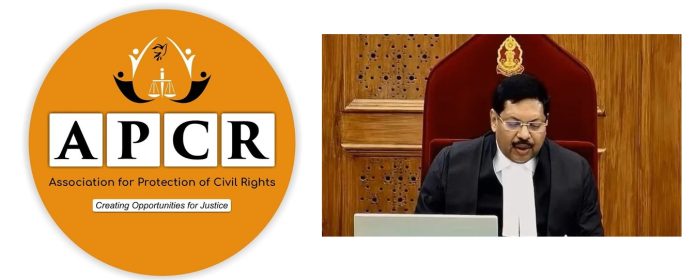New Delhi: The Association for Protection of Civil Rights (APCR) has strongly condemned the attack on Chief Justice of India, B.R. Gavai, when an advocate threw a shoe at him inside the Supreme Court premises on 6 October 2025. Addressing the media in a press release, APCR stated, “The attacker, identified as Rakesh Kishore, reportedly shouted slogans opposing what he claimed was an insult to Sanatan Dharma while targeting the Chief Justice. The incident took place during proceedings related to the reconstruction of a damaged Lord Vishnu idol in Khajuraho, where Justice Gavai’s remarks had allegedly drawn political attention from certain right-wing groups.
Chief Justice Gavai maintained composure throughout, continuing the court session and stating, “I am the last person to be affected by such things.” His response underscored his dedication to upholding judicial decorum and the values of the Constitution.
This event carries added significance as Justice Gavai is only the second Dalit to serve as Chief Justice of India, after Justice K.G. Balakrishnan. Dalits have historically faced exclusion from the highest ranks of Indian institutions. Official data highlights the underrepresentation of marginalized communities in the judiciary. Since 2018, of all High Court appointments, 78% have been upper-caste, while Scheduled Castes accounted for only 22 judges, Scheduled Tribes 16, OBCs 89, and minorities 37. Among Supreme Court judges, around 36% are from Brahmin backgrounds, even though Brahmins make up just 5% of India’s population.
In 75 years of the Supreme Court, only two Dalit judges have served as Chief Justice, with few judges from SC/ST/OBC communities ever elevated. This concentration of power reflects a systemic bias that persists within India’s judiciary. The act of targeting a Dalit Chief Justice carries symbolic weight, as shoe-throwing historically represents humiliation, and in this context, it reflects underlying casteist undertones.
The attack coincides with the centenary of the Rashtriya Swayamsevak Sangh (RSS), an organization often criticized for supporting caste hierarchies. The timing underscores the political and ideological climate where voices advocating social justice and equality face hostility.
APCR has demanded a transparent investigation and appropriate legal action against the attacker. The association emphasized that the judiciary, Bar Council, and legal community must condemn this act as an affront not only to an individual but to the institution itself. APCR also urged the collegium and government to strengthen diversity and inclusion in judicial appointments to ensure meaningful representation of Dalit, Bahujan, Adivasi, and minority communities.
Law schools, bar associations, and judicial institutions should incorporate caste-sensitivity and diversity training into their curricula. The incident demonstrates that caste prejudice persists even in the highest institutions of power. True equality, as envisioned by the Constitution, remains unrealized until such hierarchies are dismantled.”
APCR reaffirmed its commitment to combating all forms of hate, including casteism and communalism. The association stands in solidarity with those dedicated to upholding dignity, equality, and justice, which remain central to India’s democratic framework.




